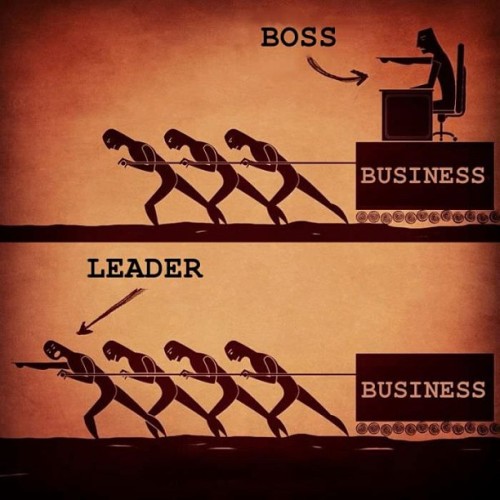I'm the boss!
I wanted to write an article centered around the difference between a boss and a leader. So often these two terms are confused, but the person most likely to confuse them is your boss! Sifting through led me to several well written articles already out there. So maybe the focus shouldn't be how to spot the difference in the world, but how to spot the difference in yourself.
It's difficult to be objective about your own personality. The way you deal with people is rarely to be talked about in front of you, but your interactions with those who work for you are tantamount to your success and theirs. So in the absence of being able to candidly talk with your employees and short of doing a survey, here are a few ways to identify what their behavior says about you.
Check yourself before you wreck yourself!
The points below are indicative of being a boss instead of a leader. Check to see if you're that guy in the office.
People talk negatively about you in public.
- Ever have someone say that an employee gave you accolades at an event or to a client? When people speak about you and the good work you're doing unprompted, chances are they look at you as a leader. Obviously, negative speech would suggest that they view you as a boss, but saying nothing can just as likely mean the same thing. If no one is talking about you, maybe you're not doing anything worthy enough to be talked about.
They don't bring new ideas to the table.
- Many times people will not speak up when they feel oppressed. This is especially true of those people who used to speak out and perform well, but settled into only asking for directions instead of brainstorming with you. When people are afraid to speak, it probably says you're too busy talking to listen or do what you want regardless as a default. When you have no one else to offer great ideas, then you've bull-dozed your greatest chance for success - innovative and invested employees.
They don't silence the squeaky wheel.
- Most offices will have at least one person who is complaining on a consistent basis. Are other people complaining about that person? Probably. But are they also disagreeing? If they complain about the attitude of that person, but agree with their arguments, then there's a problem. Also, if the only one negating them the guy kissing your ass, then you don't have a reliable source.
Ask not what your employees can do for you...
- You ask what your team can do for you instead of asking what you can do for them. When is the last time you went out of your way to help an employee or asked what you can do to make their job easier? If it's more likely that you only ask for results from them and nothing else, your not holding up your end of the deal.
Everyone is your secretary.
- Employees spend more time doing what you don't want to or don't have the time to do instead of their own jobs. If you are the person in the office always asking others to make copies, schedule phone calls, or asking last minute favors, then you're the boss. You're no longer working for the good of the company as a whole and instead just having them work for you.
Thanks giving is just a holiday.
- You're probably smart enough to know that taking credit for someone else's work or idea is bad form. But if your good ideas are yours and someone else's becomes "the company's", then it's still the same thing. Letting people know both privately and publicly how much you value their work is something a leader does to encourage growth, team building, and goodwill.
You're only accountable to your superiors.
- Whether your superiors are your own boss or your board members if you're not answering to your employees or your community, then your not thinking about their needs. Like a boss. Leaders realize they're not the only fish in the pond and work to upgrade the whole ecosystem, not just pimp out an aquarium.
Get a clue!
There are numerous ways to work towards becoming more of a leader if that's important to you. It could include management counseling, courses, or training, or just digging through a lot of good reading. Let me recommend starting with a few below.
So what are the other differences in a boss and a leader? What have I missed?

